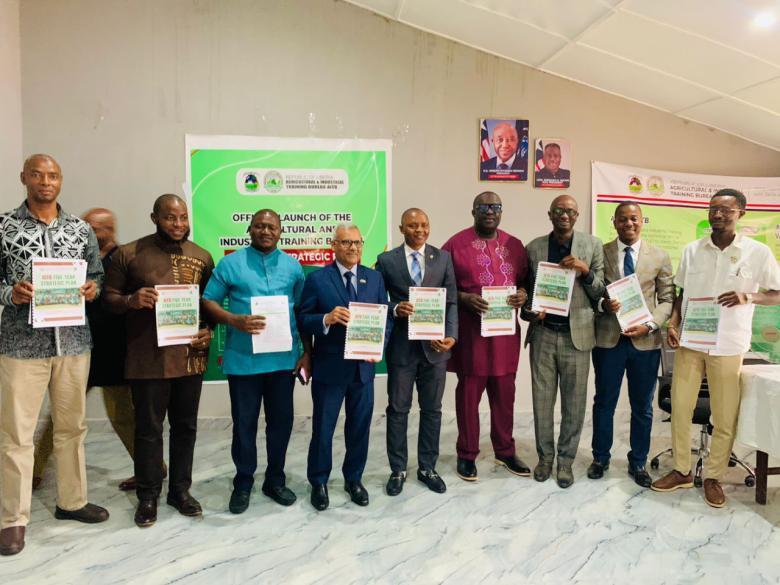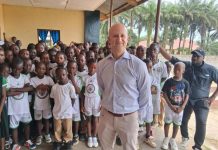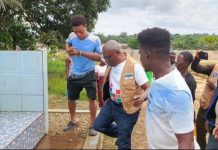Africa-Press – Liberia. DG. Billy and members of the high table display the AITB 5-Year Strategic Plan
The Agricultural & Industrial Training Bureau (AITB) has unveiled an ambitious Five-Year Strategic Plan designed to overhaul Liberia’s Technical and Vocational Education and Training (TVET) system and position the country’s young population for opportunities in an increasingly technology-driven global economy.
The plan—which covers 2025 to 2029—is being described as one of the most far-reaching workforce development blueprints since the end of Liberia’s civil conflict. It directly targets the country’s long-standing dependence on expatriate labor and seeks to cultivate a more competitive, self-sustaining national workforce.
Established in 1981 under PRC Decree No. 56, AITB was mandated to regulate vocational training standards, certify institutions, and guide national manpower development. But years of instability and institutional neglect left it underfunded and largely forgotten.
A turning point came in 2024 when President Joseph Nyuma Boakai appointed a new leadership team headed by Director General Abraham Billy and subsequently restructured the National Council for Vocational and Technical Education and Training (NCTVET). This move restored a clear chain of command and set the stage for comprehensive reforms.
Launching the new plan, DG Billy called the moment “a historic milestone,” noting that AITB is reclaiming its role as the central authority in Liberia’s TVET governance.
“This government is signaling a deep commitment to building a skilled, productive, and competitive Liberian workforce,” he said.
Strategic Goals Anchored in National Priorities
The Five-Year Strategic Plan outlines six core pillars Institutional strengthening and governance reform, Standardization and quality improvement across TVET institutions, Expansion of national access, particularly in rural counties, and Stronger connections between training programs and market demands. The others are Promotion of gender equity, inclusivity, and youth empowerment, and Mobilization of sustainable financing and partnerships.
These priorities align squarely with the government’s ARREST Agenda for Inclusive Development (2025–2029), international development frameworks such as the SDGs, and continental TVET strategies.
Billy stressed that Liberia must urgently reverse its dependency on foreign labor.
“Thousands of jobs in construction, agriculture, energy, and industrial trades are held by foreign workers while Liberian youth remain unemployed,” he said.
“This plan is our response—a roadmap for a more technical and self-reliant society.”
A Three-Phase Implementation Roadmap
The plan outlines a step-by-step rollout 2025–2026: Institutional reforms, rehabilitation of training facilities, standard-setting; 2027–2028: Expansion of training opportunities, digital integration, strengthened industry partnerships, and 2029–2030: Evaluation, national scaling, and sustainability measures.
It also proposes mobile training units, nationwide trade testing, curriculum standardization, and targeted inclusion programs for women, at-risk youth, and persons with disabilities.
“Skills training should not be confined to Monrovia,” the strategy document states. “It must be accessible to all Liberians, regardless of geography.”
To ensure transparency and effectiveness, a new Multi-Stakeholder Steering Committee—comprising government representatives, private sector actors, civil society, development partners, and TVET institutions—will monitor annual progress.
AITB also plans to digitize its operations, improve data systems, enforce accreditation standards, and build a professional technical workforce capable of sustaining the reforms.
“Our goal is consistency,” the management team noted. “Every accredited institution must meet standards that employers can trust.”
US$17.5 Million Investment and Key Partnerships
The reforms are projected to cost US$17.5 million, to be supported by government funding, private sector contributions, partnerships with UNESCO, FAO, and the Government of India, TVET trust funds, and Diaspora-driven skills initiatives.
A robust Monitoring & Evaluation framework will track employment outcomes, accreditation rates, and skills-market alignment.
For More News And Analysis About Liberia Follow Africa-Press






